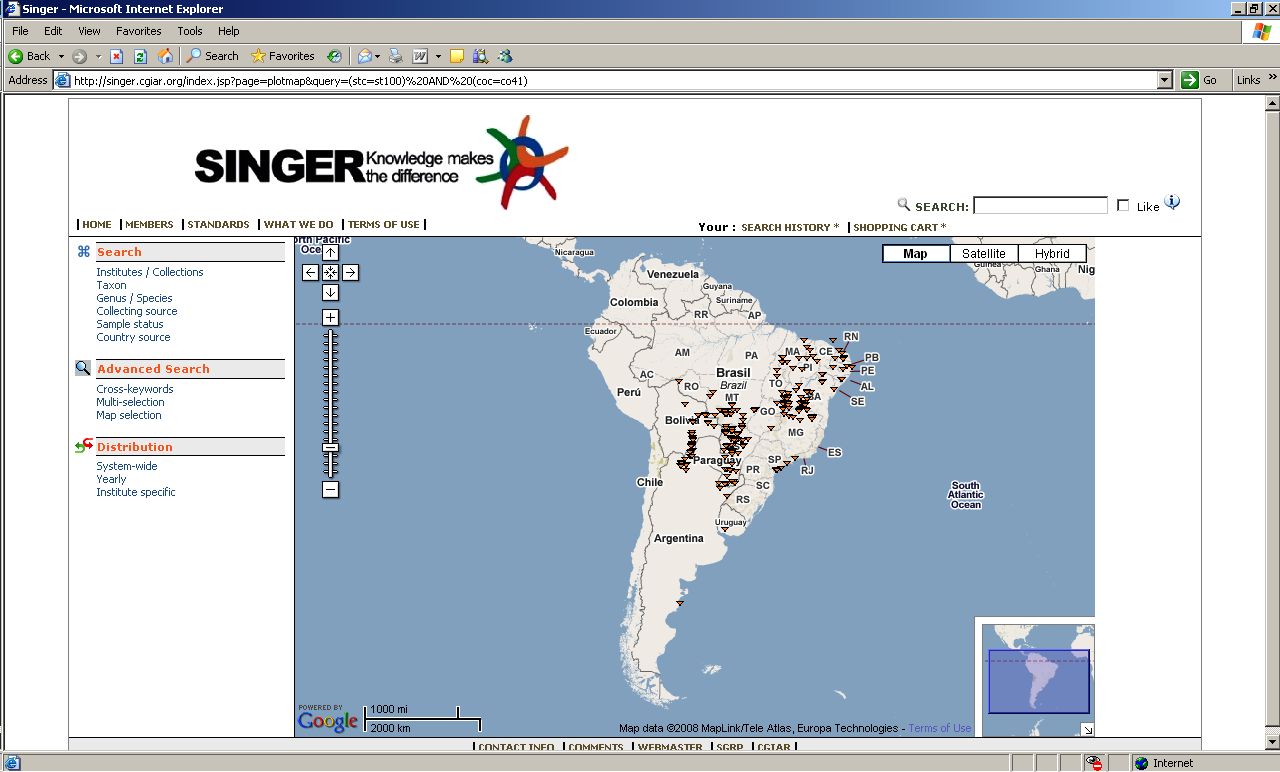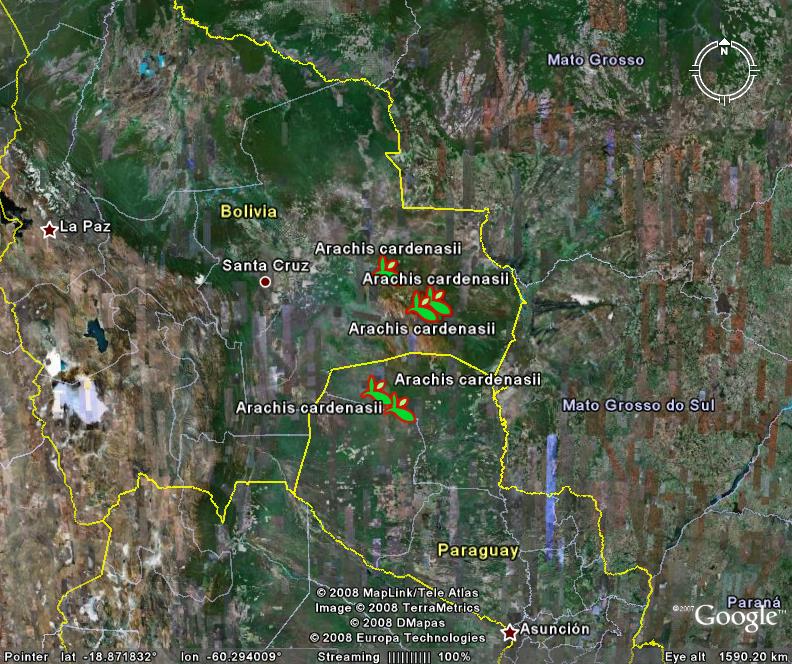- Dropping the poppy.
- Gardening on windowsills and along roadsides.
- Cooling camel milk. Via.
- Fingerprinting grapes.
- “The seed banks that are run by agribusiness corporations would be a costly pursuit for the government and farmers.” Where to start responding to this? Thanks, Jeff.
- Further evidence of food price crisis.
- “What does biodiversity mean to Syngenta?“
- Traditional healer goes online. Via.
- Videos from Global Plant Clinic.
SINGER maps crop wild relatives
Putting the new SINGER interface through its paces, I find that it can do something interesting that GRIN cannot. Or at least I can’t see a way of doing it, let me know if you can. Below is a screenshot from SINGER showing a Google Map of the distribution of all wild Arachis accessions that the database knows about which have geographic coordinates. Very useful, I think. GRIN does map localities, but I could not manage to get it to do so for multiple species like this.
SINGER’s new tune
After my intemperate comment about SINGER the other day, I’m very happy to pass on the news that the new SINGER website is now online at http://singer.cgiar.org. According to the announcement made by Bioversity International, the new SINGER has the following features:
- GIS maps using Google technology.
- Users are able to search accessions using Google Maps.
- Presentation of data in a cumulative format to help users do statistical analysis.
- Improved presentation of distribution data including across genus and species.
- Improved navigation and searching capabilities.
- Free text search.
- Links to the external databases hosted by partners to provide additional information about accessions. Example: IRRI. Click on the “IRRI Link†under links on this page to view the information.
- Users are able to view the available pedigree information on the site. Example: IRRI, WARDA, CIP. Please look for the “Pedigree†field under passport information.
- Users are able to view the availability of an accession before requesting germplasm. The “Availability†field has been added under passport information.
- Users are able to view if the accession has been placed under long term storage in Svalbard. The “Svalbard†field has been added. Example: WARDA. Please look for the “Safety-duplicate in Svalbard†field under passport information.
- Users are able to save the search history while they are navigating the site.
- Users are able to download data in the “xml†and “csv†formats.
- The shopping cart system has been incorporated – work is still in progress to incorporate the complete shopping cart for an ordering system.
Another feel-good crop wild relative story
When I saw news stories a short while back about a new peanut variety called Tifguard, famous for having resistance to both peanut root-knot nematode and tomato spotted wilt virus (TSWV), the main question I had was where the resistance(s) came from. So I consulted our resident peanut expert, and it turns out that the nematode resistance gene in Tifguard came from the variety COAN. Which in turn got it from the wild relative Arachis cardenasii. And by conventional breeding, no less.
Although saying that glosses over the fact that Charles Simpson‘s introgression programme at Texas A&M sometimes involved making more than a thousand meticulous interspecific crosses just to get a single seed. Nobody ever said using crop wild relatives in breeding programmes was easy! Anyway, this is a truly exemplary case of what can be done to incorporate genes from crop wild relatives into improved cultivars using “conventional” breeding methods.
Not much A. cardenasii in GRIN or SINGER. 1 GBIF adds data from a couple of herbaria, but in total we’re talking about no more than about 30 records or so, some of which are no doubt duplicates.
MUCH LATER: Follow-up, with live links!
Nibbles: Extension, Seed, Vegetables, Sushi, Beetroot
- Talking to farmers. Gotta love it.
- ASTA’s Guide to Seed Management Practices. Need to register, but it’s not a big deal.
- The next Oxford Symposium will take place at St Catz on 12-14 September 2008. The Topic is Vegetables. Jeremy will be there.
- Fishy diversity … and not in a good way.
- Everything you ever wanted to know about Chioggia beets but were afraid to ask.

